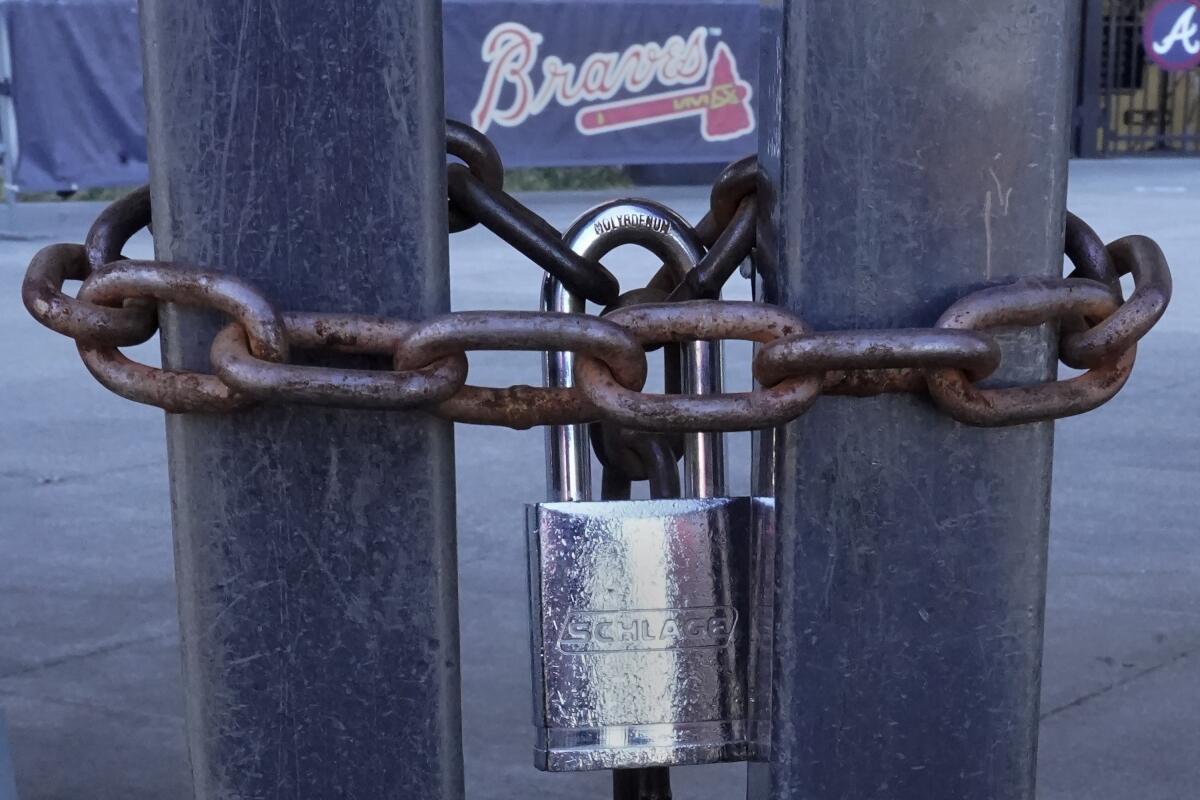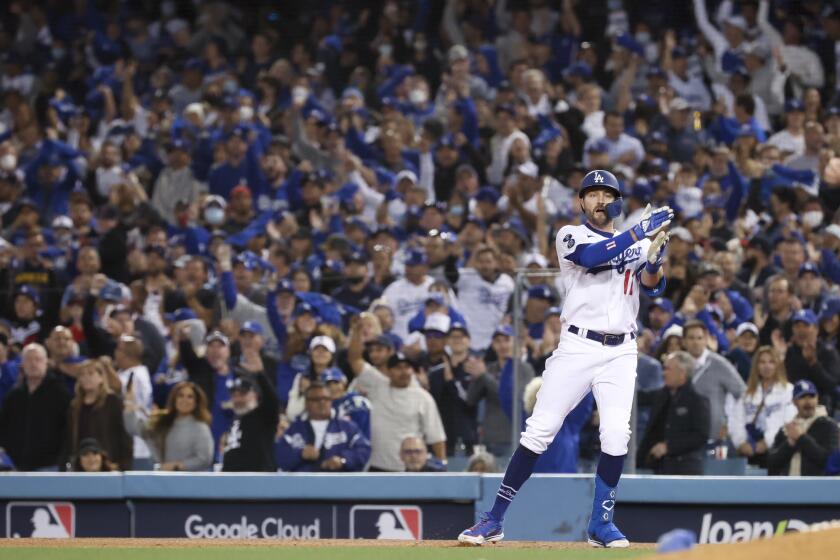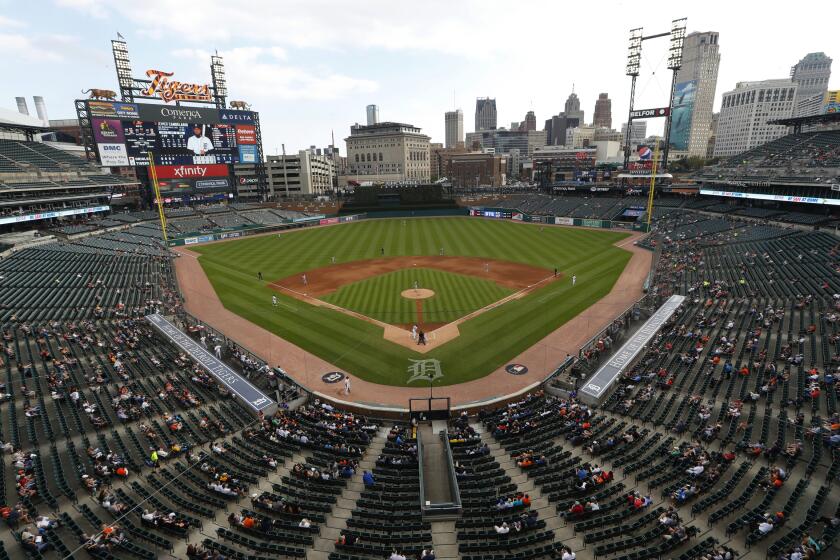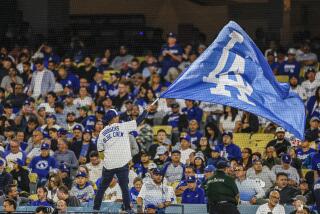MLB cancels another week of games as talks to end lockout break down

- Share via
NEW YORK — Another week disappeared from the shrinking baseball schedule Wednesday, with negotiations that had been whittled to one major issue suddenly erupting into a cascade of new issues that could make for a long, cold spring between owners and players.
For the second time in two weeks, talks on a new collective bargaining agreement collapsed under the weight of a league-imposed deadline. Now, the league says, no games will be played until at least April 14.
With any future delays, MLB would lose games on April 15, the 75th anniversary of Jackie Robinson’s major league debut.
In a statement, the players’ union called the cancellation of additional games “completely unnecessary” and said the league had declined to respond to the union’s most recent proposal.
On March 1, three months after owners locked out players, Commissioner Rob Manfred called off the first week of the regular season. When owners and players resumed discussions this week, the league offered to reschedule those games as part of a new agreement, providing a full 162-game season and full pay for players.
Now, with what the league probably considers too many games to reschedule, the players’ union would ask that a new deal pay players and credit them with service time for unplayed games. The union previously has warned the league it would not approve an expanded postseason this year if players are not paid for a 162-game regular season.
At the same time, the owners probably would cite the revenue losses from canceled games and could offer less favorable terms in key areas where the two sides were nearly in agreement Wednesday: how much to pay players not eligible for salary arbitration, and how much a team could spend without paying a luxury tax.
All of those concerns would not have come into play had a deal been reached Wednesday, but the two sides could not reach agreement on one final core issue: an international draft.
According to a Los Angeles Times/SurveyMonkey poll, 6 in 10 Americans who are baseball fans say they’ve lost interest in this season because of the lockout.
The owners proposed launching one in 2024, so that a teenager from the Dominican Republic would enter MLB the same way a teenager from Los Angeles would. Now, international amateurs are free agents.
The league previously capped how much teams could spend on international amateurs, but individual players still can make unofficial agreements many years before the official signing age of 16, often with local trainers demanding a cut of any signing bonus.
Latin American major leaguers endorse reform but are wary of the league with a history of cost-cutting imposing its own system, even as the league projected teams would spend more money on international amateurs than they do now. David Ortiz, who remains particularly influential among Dominican players even in retirement, suggested to ESPN that an international draft could be worthy if it was discussed among the league and the union over a number of years.
In the Dominican Republic, unlike in the United States, baseball is the undisputed national sport, with dreams built on the shoulders of such national heroes as Ortiz, Vladimir Guerrero, Pedro Martinez and Albert Pujols.
“Taking time — that makes more sense,” Ortiz said. “OK, guys, let’s keep up this pace to do it three, four years from now. We sit down with the big-time players. We listen to what they have to say. If we’re going to do it, let’s do it right. Rushing it like this is not right.”
Amid resistance within the union, the league offered three options. If the union were to accept the international draft, the owners would allow free agents to be signed without their new team losing draft picks. If the union were to decline, the draft-pick compensation would remain.
The third option would have been to finalize a new collective bargaining agreement now, including the elimination of draft-pick compensation, then give the union until Nov. 15 to agree to the international draft. If the union still declined, the league could reopen the collective bargaining agreement following the 2024 season, essentially turning a five-year deal into a three-year deal.
The union countered with a different offer keyed to Nov. 15: If the players did not agree to an international draft by then, the parties would revert to the current system, with the qualifying offer back in force.
The owners promptly canceled another week of games.
Bill James, the father of modern analytics, says there are a lot of rule changes that could make baseball a better game.
“In a last-ditch effort to preserve a 162-game season,” Manfred said in a statement, “this week we have made good-faith proposals that address the specific concerns voiced by the MLBPA and would have allowed the players to return to the field immediately.”
He added: “I am saddened by this situation’s continued impact on our game and all those who are a part of it, especially our loyal fans. We have the utmost respect for our players and hope they will ultimately choose to accept the fair agreement they have been offered.”
Within two hours, the league decided to consider the union’s offer after all, with discussions taking place late Wednesday night, according to a person familiar with the talks.
Said the union in its statement: “Players want to play, and we cannot wait to get back on the field for the best fans in the world. Our top priority remains the finalization of a fair contract for all players, and we will continue negotiations toward that end.”
More to Read
Go beyond the scoreboard
Get the latest on L.A.'s teams in the daily Sports Report newsletter.
You may occasionally receive promotional content from the Los Angeles Times.













